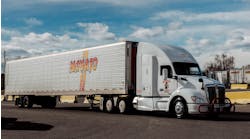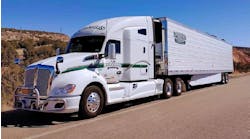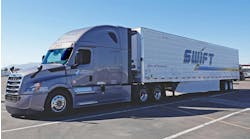The times truly have changed.
With the novel coronavirus upending lives, and the economy, the country can feel almost unrecognizable today from what it was only a few months ago. And, more broadly, transportation equipment has evolved over the last few decades, along with many of the faces, routes and sites seen over the road.
But the people behind Imler’s Poultry, and their mission, which is centered on customer and employee satisfaction, has stayed the same through it all, since Refrigerated Transporter first profiled the Pennsylvania operation 30 years ago and back much further—through six generations, and more than 100 years of family ownership.
“We service our customers different than anybody else,” said Fred Imler II, co-owner and president of Imler’s. “If we mess up an order, we don’t say, ‘Well, your next delivery day is Monday.’ If we mess the order up today we take care of it today, whether it’s running a special trip or whatever. The only thing we have to offer that nobody else has is service, and that’s because of the dedicated employees we have and our family tradition.
“We’re going to take care of the customer.”
Imler’s origins
Bryan Imler, 45, who oversees all aspects of the business after focusing on sales and purchasing for many years; his father, Fred Imler II; and his grandfather, Fred Imler Sr, run the 117-year-old company together. Fred Imler II recently turned 64, and he said his dad, who recently reached 87—both were born April 30—still loves beating him to work. They’re driven by passion for what they do, and long-standing pride in the company’s history.
The business traces its origins to 1903, when Leff Imler, Fred Sr’s great, great uncle, operated a general store in Rainsburg where he traded with local farmers. Fred Sr’s grandfather purchased the business in 1915, and three years later moved it to downtown Altoona—where they operated for nearly 100 years.
See related link to Imler's Fleet Flashback
Imler’s continued to grow as a wholesaler and distributor of poultry and other products through the 1940s under the guidance of Fred Sr’s father, Lester Imler, and Fred Sr became a partner in 1951. Growth across the next four decades included switching to buying and distributing processed poultry to increase distribution volume—they grew their own turkeys and chickens in the early years—to an expanding roster of retail customers like Kentucky Fried Chicken, Fred II’s emergence as a partner in the business in 1968, and a name change in 1980, from Imler’s Turkey Farm to Imler’s Poultry.
By the time Refrigerated Transporter caught up with Imler’s for its October 1990 edition, the company was supplying 50 KFC locations, and distributing poultry and meat to customers across central Pennsylvania within a 150-mile radius of Altoona. Their vehicle fleet then included seven tractors and nine 48-foot refrigerated trailers for long-haul trips; and two tractors, two 36-foot trailers and 10 straight trucks for local distribution.
Catching up
The business certainly hasn’t stood still in three decades since 1990.
Imler’s expanded operations with Imler’s Poultry Transportation in 1992, further separating transportation activities, including contract carrier operations for outbound customers on long-haul trips, from the poultry company. Fred II said the legal move also gave them broader operating authority and helped them deal with increasing regulatory oversight.
The company was starting to get into hauling beef, pork and deli items in the early 1990s, but poultry remains its signature item, with roughly a 70-30 mix of poultry to other items today. The key to growth then, Fred II says, was to increase business with existing customers by delivering them more products. Adding new customers still is important but existing customers are a known commodity, with hard-won relationships, well-known financials and convenient locations that work well with established distribution routes.
“Whenever we were already going to a lot of these stops, rather than going out trying to find new customers to sell only poultry to, we decided that it was important to add more line items to an invoice for existing customers,” Fred II recalls. “And back in the early 90s, we went from averaging about five line items per customer, to today it’s in excess of 20 line items per customer.”
Imler’s secured regional distribution awards with the United States Department of Agriculture (USDA) in 1999 and 2000, making it one of five distributors of government commodities in the state, and the company continues to warehouse and distribute product for the USDA to local schools, institutions and food banks.
The operation added a 14,000-square-foot freezer facility at its original location in 2002, when it also was renting two other warehouses. But the big move came in 2010, when Imler’s purchased the former WS Lee building strategically situated in the suburbs of Altoona, now called Duncansville, at the intersection of US Route 22 and Interstate 99, more than doubling its space, from 55,000 square feet to 120,000 square feet.
And in 2012, Imler’s added a four-bay garage, and long-time partner Fox & James, a NationaLease affiliate that supplies Imler’s vehicles, moved in as a full-time maintenance provider for the company’s leased trucks and trailers.
“The move out here was huge for us,” Fred II said. “We were almost in downtown Altoona. Now we’re in the suburbs, and we’re right at the intersection of two limited-access highways—Route 22 that runs east and west, and I-99 that runs north and south. So we’re almost in the middle of a cloverleaf that connects those two freeways. Now we have a great location that saves us time. It was about 4 miles from the exit until we got to our location in Altoona. Now when you come off the exit ramp you pull almost directly into our facility.”
Consulting drivers
Fred II said 30 years ago that discussing specifications with drivers before and after vehicle purchases made Imler’s a better place to work. That hasn’t changed either. After all, no one knows the trucks and trailers better than the people operating them. The size of Imler’s vehicle fleet, however, is vastly different today.
The long-haul fleet now includes 32 sleeper tractors and 41 53-foot trailers, and the company deploys four day-cab tractors, six 42-foot trailers and 15 straight trucks for local distribution. So Imler’s combined fleet has grown from 30 vehicles in 1990 to 98 in 2020, with approximately 70 truck drivers behind the wheels.
All ’66 Corvette-yellow tractors are Volvos, and the majority boast “smooth-shifting” fully automatic transmissions Jim Gonter, Imler’s long-time transportation coordinator, says most drivers really like, although the company does have five 13-speed standard transmissions for the old-school drivers who appreciate the control, and all drivers are required to train on automatics and standards so they’re never stranded.
The newest Volvos in the fleet are VNL 860s with driver-centric sleeper cabs measuring 96 inches wide and 77 inches long, diesel-powered Volvo D13 455-horsepower engines, and Volvo Active Driver Assist, which includes Bendix Wingman Fusion, a camera- and radar-based collision mitigation system. Imler’s also runs a handful of 780s.
“We run with a Volvo engine, and they’ve performed well, as far as fewer breakdowns,” said Gonter, who started with Imler’s as a driver 36 years ago. “If a sensor comes up … Volvo can let us know, and a lot of times we can keep running the truck until we get it home, or to a repair shop. Our downtime seems to be better with the Volvos than any other trucks we’ve run.”
The trailers all are Utility 3000R refrigerated trailers insulated for cold or frozen goods. They feature 55,000 pounds of payload capacity and E-tracks for securing carefully arranged pallets that safely maximize cargo space. “Chicken is notorious for taking up a whole box, and those boxes stack better than, say, eggs or salads, and things like that,” Fred II said. “So our loads fit together well. We put heavier stuff on the bottom of the pallet and build pallets that way, and all the items we put in the truck we handle very carefully, and that fits in well with our distribution.”
Imler’s straight trucks all feature Freightliner M2 cabs with Cummins L9 350-horsepower engines and six-speed automatic transmissions, and truck bodies with ramps from Morgan Truck Bodies.
Reefer units
The key pieces of equipment in Imler’s reefer fleet are the diesel-powered Thermo King truck and trailer refrigeration units, which Imler’s leases from Fox & James. The 47 trailers all run with single-temperature Precedent C-600 reefers, and the straight trucks use T-880R units with quick-tempered technology.
Imler’s first turned to Thermo King of Pittsburgh in the 1970s when Fred II was seeking parts and maintenance information about the gas-powered XMT Thermo King units on two straight trucks Imler’s acquired after it purchased a chicken processing company. The two businesses have worked together ever since, with Thermo King of Pittsburgh providing new equipment every three to seven years. The dealership also provides support services with parts, warranty, repairs and new-equipment training for the leased equipment.
Imler’s tractors also feature diesel-powered Thermo King TriPac Evolution auxiliary power units (APUs) designed to reduce engine idling, save fuel and increase driver comfort by ensuring the cab stays warm in the winter and cool in the summer. The APUs also power sleeper-cab accessories and ensure batteries remain fully charged.
“They are very loyal customers and have a well-run family business that has spanned many generations,” said Bob Price, CEO of Thermo King of Pittsburgh. “They can be tough, and they keep us on our toes, but they always are a pleasure to do business with, and the way they treat their employees is impressive. Take the TriPac units for instance. We set the parameters up for driver comfort, not fuel savings, and they usually run the units over the weekend, so the cabs are at temperature when the drivers arrive.”
Fully accessorized
In line with making sure drivers are comfortable on the road, Imler’s also specs its sleepers with refrigerators and easily accessible microwave plugs. The company also pays for SiriusXM satellite radio and EpicVue satellite TV, ensuring drivers never are bored, even while taking the mandated 10 hours off under new hours-of-service rules. The EpicVue package includes a satellite dome mounted on top of the tractor, DirecTV receiver, 24-inch flat screen TV, mounting and cabling equipment, and local area antenna.
“(Fred II) always tells me, ‘Jim, whenever you spec out a truck, spec it like it’s something you want to drive,’” said Gonter, who added that ownership quickly approved the luxury when they discussed it two years ago.
The trucks also feature Verizon Connect electronic logging devices (ELDs), Ex-Guard grille guards, on the tractors and straight trucks, and Lytx DriveCam cameras.
The grille guards have proven invaluable in mitigating costly damages to trucks, Gonter said. “Nowadays, with the cost of repairs, just the headlights on these trucks are $1,000, and with those guards on there, if you hit a deer or even if you’re in a slight accident, there hardly ever is any damage done to the truck,” he maintained.
The front- and cab-facing Lytx cameras help ensure accidents never occur. The cameras always are recording what is in front of the truck, Gonter said, but they save only 12 seconds of video when there is a triggering incident, like an accident or hard brake, with 8 seconds before the incident and 4 seconds afterward. “You can see exactly what the driver’s seeing out the window, plus you can also see the driver, and what he’s doing,” Gonter said.
Video is downloaded and reviewed by Lytx early every morning, and then emailed to Imler where appropriate. Users can tailor notifications for what they want to monitor in the cab, like seatbelt or cell phone usage. Gonter said drivers were wary of the cameras when they first were installed but now understand their value, particularly in protecting them from less cautious passenger vehicles and over-eager adjusters.
“We had one incident down in Maryland where a car pulled right out in front of our truck,” Gonter recalled. “It was a pickup, and our truck tried to stop but it caught the back end of the pickup. Well, their insurance company came back and said your truck ran into our driver. I said ‘No, your guy pulled out in front of our truck.’ So we were talking, and I said, ‘Well, I’ll send you the video.’ I sent him the video and a few minutes later the guy called me back and said ‘Don’t worry about it. It was totally our driver’s fault.’”
Equipment maintenance
The four-bay garage added in 2012 ensures Imler’s never needs to go off site for truck or trailer cleaning or maintenance. The garage includes one wash bay staffed by Imler’s and three maintenance bays staffed by Fox & James, which maintains Imler’s equipment and an equal amount of equipment for other customers.
Imler’s recently added Penske as a leasing partner, but most of its equipment is leased from Fox & James, which has been its primary equipment and maintenance provider since 1990. Fred II said leasing over ownership is more attractive because keeping up with equipment, especially with today’s technology, is a full-time job.
“We aren’t the experts in maintenance, and those companies have the knowledge, in road failures, tire failures on the road—all that stuff,” Fred II said. “At one time I took care of all that, and all night long I’d be dealing with a blown tire, lights out on the trailers, that type of thing, so we turned that over to them, and if a driver has a problem on the road, the first call is to them, and then we’re notified second. We’re counting on the leasing companies to take care of any road failures in a timely manner. We’re an individual facility in Duncansville, Pennsylvania, but we have trucks all over the country, so when they break down, they have the resources to go out and find the third parties to take care of them.”
Fox & James keeps nine full-time mechanics and two supervisors at the garage. If a truck breaks down on the road—which isn’t as common thanks to Volvo’s sensors and remote monitoring, which often can predict a problem before it happens—Fox & James routes it to a NationaLease affiliate or Volvo dealership.
Imler’s typically rotates out tractors and straight trucks every three years, and trailers every seven, depending on mileage. The company likes to run tractors around 600,000 miles and straight trucks 350,000 miles. Fox & James also keeps an eye on vehicle efficiency, and if a tractor or trailer isn’t proving cost-effective for either party, they’ll pull it out of service early; and if a truck comes off its full-service lease in April, but Imler’s still needs it in May, Fox & James will put it into its rental fleet, but still allow Imler’s to use it.
Imler’s wash bay is staffed by four full-time employees. Trucks and trailers are scrubbed inside and out with brushes and sponges after every trip. Fred II said Imler’s has disinfected the backs of its trailers and straight trucks every time they’re unloaded since he was a kid, but they’ve bolstered procedures since the start of the coronavirus pandemic. Drivers are asked to keep their trucks extra clean, and the cabs are thoroughly sanitized by the cleaning staff daily, with a disinfectant spray applied to every surface, including the steering wheel, seats, and all knobs and controls. “We do a more intensive cleaning now,” Fred II said.
Booming operation
Imler’s delivery area now includes Pennsylvania, Ohio, New York, New Jersey, West Virginia, Virginia, Maryland and Washington DC, representing a 250-mile radius from Duncansville. The company employees around 180 people, and they stayed busy during quarantine, even as many of Imler’s peer companies—and Fred II’s long-time friends—have struggled, primarily because most of its business is with retail customers, like meat markets and grocery stores, instead of restaurant and foodservice companies.
Employees have continued to come to work. Fred II says their customers’ ability to see how they operate, and put faces to voices on a phone and names in an email, is another key to their success. Protection still is a personal decision (except where mandated by government) but most employees have worn masks and gloves, and drivers are advised to proceed with caution in areas with high concentrations of coronavirus cases.
“Our business has increased and continues to increase,” Fred II said while lamenting those who’ve been less fortunate. “We’re setting record numbers, as far as tonnage being shipped, almost every day. So our business is good.”
Imler’s also is diverse enough to withstand fluctuations in demand. It hauls commodity products for many different types of companies, including food and beverages, furniture wood and even clay sport targets. Imler’s sources most of its poultry from long-time suppliers in the Delmarva peninsula, and also brings in some from South Carolina and Georgia, and most of its beef and pork comes out of the Midwest.
“We still do business the way we did in the 90s, and even before,” Fred II said. “Every customer still is important, whether it’s the guy buying two cases of chicken or the guy buying trailer loads a week. We put a lot of effort into our service … but we can’t do that without the workforce we have. I’d put our employees up against anybody’s in the industry.”
Download a pdf version of the October 1990 story on Imler's Poultry



